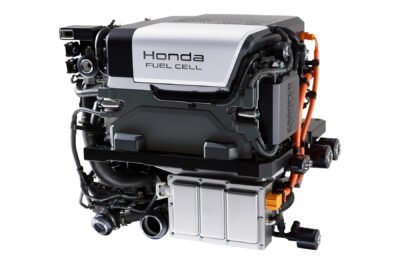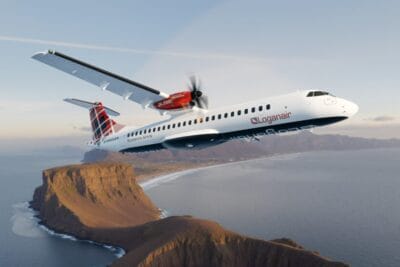HyPoint reveals aviation fuel cell prototype
US hydrogen engineering firm HyPoint has unveiled the first working prototype of its air-cooled hydrogen fuel cell for electric aircraft. The Californian startup plans to start selling the fuel cells to aerospace and eVTOL customers as early as 2022.
HyPoint was founded in 2019 and supplies zero-emission aircraft company ZeroAvia among others. HyPoint’s fuel cell system for aviation was first announced in June last year. Now the startup is able to reveal the key figures for its HTPEM (high-temperature proton-exchange membrane) fuel cell that the company is calling the ‘turbo-cooled fuel cell’. According to the company, the system achieves up to 2,000 watts per kilogram of specific power and an energy density of up to 1,500-watt hours per kilogram.
HyPoint’s approach is based on using compressed air for both cooling and oxygen supply to the HTPEM, which the developer claims will be three times lighter than comparable liquid-cooled low-temperature fuel cell (LTPEM) systems. The solution is also said to utilise a number of technical innovations, such as lightweight bipolar plates and a conductive, corrosion-resistant coating. HyPoint claims the system will reduce the total cost of ownership for aircraft manufacturers by up to 50 per cent.
The Californian company says that addressing these core issues has allowed them to “cut years off commercial delivery timelines for hydrogen aircraft and unlock the emerging hydrogen aviation market.”
Key validation tests to prove technical feasibility have also been completed. “The prototype has passed a number of subsystem tests that strongly suggest that our patented technology and unique approach works,” points out Alex Ivanenko, founder and CEO of HyPoint.
The next step will involve tests in cooperation with the National Renewable Energy Laboratory (NREL), a facility at the US Department of Energy. This is where the technology will be further tested and validated. Along with research projects into overcoming technical barriers, NREL also conducts projects researching and developing manufacturing process improvement to enable high-volume fuel cell production, systems analysis to identify the most promising commercialisation pathways, and market transformation to support early market deployments.
“Over the past several months, interest in hydrogen companies has reached a fevered pitch, in part because the world is waking up to hydrogen as a clean, reliable, and abundant fuel source. The hydrogen economy is here,” said Jordan Levy, managing partner at SoftBank Capital NY and founding partner of Seed Capital Partners, an early-stage venture capital fund.
This is no exaggeration. In the last 12 months alone has seen enormous interest in hydrogen fuel cell technology, most specifically in areas that are unsuitable for purely battery electric power alone. In November last year, the US Department of Energy (DOE) released its Hydrogen Program Plan which focuses on hard-to-decarbonise sectors such as aviation, as well as long-haul trucking and maritime applications, just a few months earlier the EU Commission released its Strategy for Energy Systems and Hydrogen, making it clear that the use of hydrogen in transport “should be utilised in cases where electrification is not feasible,” identifying aviation as one such field. Although electrification is possible and already happening with small aircraft, commercial aircraft and longer flights are a different question altogether.
In announcing the functioning prototype, HyPoint iterates its ongoing collaboration with ZeroAvia as an OEM partner. In June 2020, there was also talk of a cooperation with the Israeli air taxi developer Urban Aeronautics, although this cooperation is not mentioned in HyPoint’s current announcement. What HyPoint also mentions is that it was named a winner of NASA’s iTech initiative in December 2020.
On its website, HyPoint says that its turbo air-cooled fuel cells are suited for a variety of aviation and air mobility uses including for logistic drones, air taxis, electric vertical takeoff and landing vehicles (eVTOLs), but also fixed-wing airplanes.
Val Miftakhov, founder and CEO of ZeroAvia which is relying on HyPoint technology says: “Last year we proved that hydrogen-electric aircraft are not only possible but inevitable — and now we are working hard to get a 100-seat zero-emission aircraft in the skies before 2030.”





1 Comment